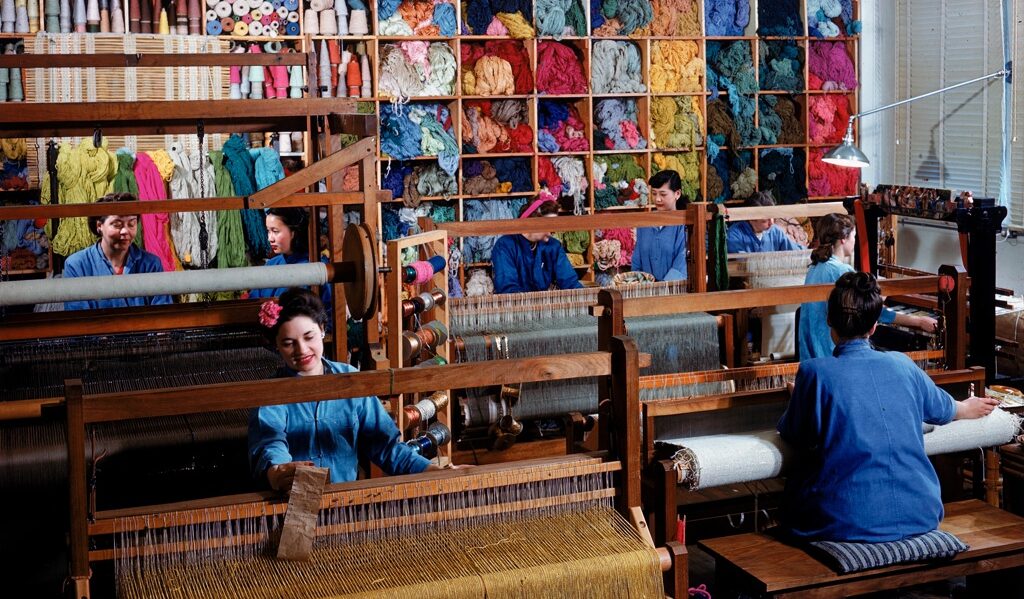In celebration of the final weeks of A Dark, A Light, A Bright: The Designs of Dorothy Liebes, join the exhibition’s curators, conservators, and book contributors for a series of presentations offering new research on Liebes’s career and work from a range of perspectives. Topics will include Liebes’s experimental approach to color and materials; conservation research on synthetic fibers often used by Liebes; her advocacy on behalf of what she called “the international language of textiles;” and the broad network of artists and designers who spent time in her studio before forging their own careers. These presentations will also provide insight into putting together this major exhibition on the designer the curators call, “the most influential designer you have never heard of.”
ABOUT THE PROGRAM
- Program Length: 3 hours
- Interactivity Level: Low to medium
- Intended Audience: People curious about design, textile design, women designers, interior design, weaving, craft and technology, and the narrative power of textiles.
- Free with museum admission; seating is first come first served
Schedule
1:00 Opening Remarks
1:10 Susan Brown, “The Idea Factory”
1:40 Kira Eng-Wilmot, “Under the Microscope: Materials Analysis of Liebes’s Textiles”
2:10 Emily Orr, “Modern Weaving’s Global Ambassador”
Break
2:40 Erin Dowding, “Cranbrook’s Connection to the Dorothy Liebes Studio”
3:10 Alexa Griffith Winton, “Vibrance and Luminosity: Textiles Designed for Light”
3:40 Q&A and discussion
SPEAKERS
Susan Brown
Susan Brown is Associate Curator and Acting Head of Textiles at Cooper Hewitt, Smithsonian Design Museum, where she oversees a global collection of over 27,000 textiles produced over 2,000 years. She is the co-curator, with Alexa Griffith Winton, of A Dark, A Light, A Bright: The Designs of Dorothy Liebes, and co-editor of the accompanying book, published by Yale University Press. Her past exhibitions for the museum include Extreme Textiles: Designing for High Performance; Fashioning Felt; Color Moves: Art and Fashion by Sonia Delaunay; Scraps: Fashion, Textiles and Creative Reuse; Contemporary Muslim Fashions; and Suzie Zuzek for Lilly Pulitzer: The Prints that Made the Fashion Brand.
Kira Eng-Wilmot
Kira Eng-Wilmot has been the Senior Textile Conservator at Cooper Hewitt since 2013. She holds an MA in fashion and textile studies: history, theory, and museum practice from the Fashion Institute of Technology.
Emily Marshall Orr
Emily M. Orr is Associate Curator and Acting Head of Product Design and Decorative Arts at Cooper Hewitt, Smithsonian Design Museum. She holds a Ph.D. in the History of Design from the Royal College of Art/Victoria & Albert Museum in London. Her exhibitions at Cooper Hewitt include Give Me a Sign: The Language of Symbols (2023-24), Underground Modernist: E. McKnight Kauffer (2021-22), Botanical Expressions (2019-21), and Jazz Age: American Style in the 1920s (2017). She has published on a range of design history topics and is the author of Designing the Department Store: Display and Retail at the Turn of the Twentieth Century (Bloomsbury, 2019) and co-editor and author of E. McKnight Kauffer: The Artist in Advertising (Rizzoli Electa/Cooper Hewitt, Smithsonian Design Museum, 2020).
Alexa Griffith Winton
Alexa Griffith Winton is a design historian and educator. She is currently Manager, Public Programs and Interpretation at Cooper Hewitt, Smithsonian Design Museum. She has researched and published on the work of Dorothy Liebes for over 10 years. Griffith’s work has been published in scholarly and popular publications, including the Journal of Design History, Dwell, Journal of the Archives of American Art, and the Journal of Modern Craft. She has received research grants from the Graham Foundation, the New York State Council for the Arts, Center for Craft, Creativity and Research, Nordic Culture Point, and the Beverly Willis Architecture Foundation. She is the co-curator, with Susan Brown, of A Dark, A Light, A Bright: The Designs of Dorothy Liebes, and co-editor of the accompanying book, published by Yale University Press and Cooper Hewitt, Smithsonian Design Museum
ACCESSIBILITY
- Location: This program will take place in person in the Process Lab Library at Cooper Hewitt (2 East 91st Street, New York, NY). The Process Lab is on the first floor of the museum and fully wheelchair accessible. There is an accessible restroom on the ground floor, accessible via elevator. Theater-style seating will be available. Read more about accessibility at Cooper Hewitt.
- What to Expect: This program will include illustrated presentations with slides by the speakers followed by a conversation and an audience Q&A. The program will be recorded and available on Cooper Hewitt’s YouTube channel.
- Accommodations: The program includes live CART captioning.
- For general questions, please email us at CHEducation@si.edu. If we can provide additional accessibility services or accommodations to support your participation in this program, email us or let us know when registering. Please make your accommodation request as far in advance as possible—preferably at least one week before the program date when possible.
HEALTH & SAFETY MEASURES
Please visit Cooper Hewitt’s Plan Your Visit page for up-to-date information on health and safety guidelines.
SPECIAL THANKS
A Dark, A Light, A Bright: The Designs of Dorothy Liebes is made possible by The Coby Foundation; The Decorative Arts Trust; the Smithsonian American Women’s History Initiative, a program of the Smithsonian American Women’s History Museum; and the Terra Foundation for American Art.
The project received Federal support from the Smithsonian Collections Care and Preservation Fund, administered by the National Collections Program and the Smithsonian Collections Advisory Committee.
Generous support is provided by the Lily Auchincloss Foundation; the Lenore G. Tawney Foundation; Mergentime Family Archive; and the Samuel H. Kress Foundation, administered by the Foundation for Advancement in Conservation.
Support is also provided by Elizabeth Whelan, The Josef and Anni Albers Foundation, and Patsy Orlofsky.

